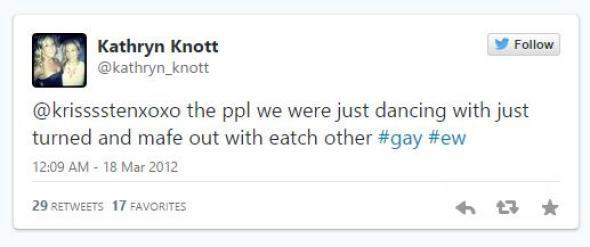On Sept. 11, Kathryn Knott (reported by some sources as Katherine Knott) and several of her friends allegedly assaulted a gay couple in downtown Philadelphia on account of their sexual orientation.* After a lengthy investigation by both detectives and social media sleuths, Knott, the daughter of a local police chief, surrendered herself to the police on Wednesday morning, alongside two of her alleged co-assailants. Although Knott is now in custody, her Twitter account remains active and open. The portrait her tweets paint—of a young woman, of a sociable party-goer, of a casual homophobe-turned-alleged hate-crime assailant—is at once disturbing and potentially illuminating.
Only a few of Knott’s myriad tweets actually convey anti-gay animus. In one, she describes her disgust at seeing two men kissing; in another, she echoes the film Anchorman in opining that “jazz flute is for little fairy boys.” A nearly incomprehensible tweet includes “#dyke” without much explanation. These constitute the extent of Knott’s homophobic missives; the rest of her Twitter feed describes shopping, or commuting, or partying, or, most notably, drinking.
In one sense, then, Knott’s tweets tell us almost nothing at all about the toxic confluence of fear, hatred, anxiety, and booze that purportedly led to her and her group’s assault on two gay men. You could, if you wish, write them off as intoxicated gaffes—but in reality, they are so much more than that. Knott’s tweets are a product of a widespread value system that, at its core, deems gay people as laughable at best, and at worst, disgusting. It was this mindset, however consciously held, that led her to turn away in revulsion at the sight of two men kissing, and this mindset, expressed under different circumstances, that allegedly drew her into an assault on a gay couple.
The Kathryn Knott who wrote those tweets and purportedly assaulted those men would not exist in a world without anti-gay hatred. Nor would she exist in a world without millions of people who have dedicated their lives to stoking that hatred at every turn. The interest groups that run ads debasing gay people as immoral and grotesque; the preachers and politicians who bash gays as diseased and perverted; the writers who fill up column after column with dehumanizing anti-gay calumny—these are the people who have built the world in which a Kathryn Knott’s casual homophobia can so quickly turn violent.
And that, of course, is the world we all inhabit. Gay people know, often by experience, that there are millions of Kathryn Knotts out there: seemingly sensible men and women whose low-level homophobia can explode with the right combination of peer pressure and alcohol. That’s why we cringe at the tossed-off epithets, the casual slurs, the seemingly minor gestures toward our ostensible deviance. What starts as quiet, steely-eyed prejudice may end in a slur. What starts as a slur may end in a punch.
The next time you hear a person insinuate that gay people are disgusting, the next time you read an article suggesting that gay people are immoral and perverse, consider Kathryn Knott. She did not come, allegedly, to find herself involved in a horrific homophobic assault out of the blue. A vast number of Americans reinforce her prejudices every day. Most of them will never commit a hate crime. But the next Kathryn Knott is out there. And when the next anti-gay attack occurs, none of us will have any right to act surprised.
*Update, Sept. 25, 2014: This post has been updated to reflect that different sources spell Kathryn/Katherine Knott’s first name differently.
